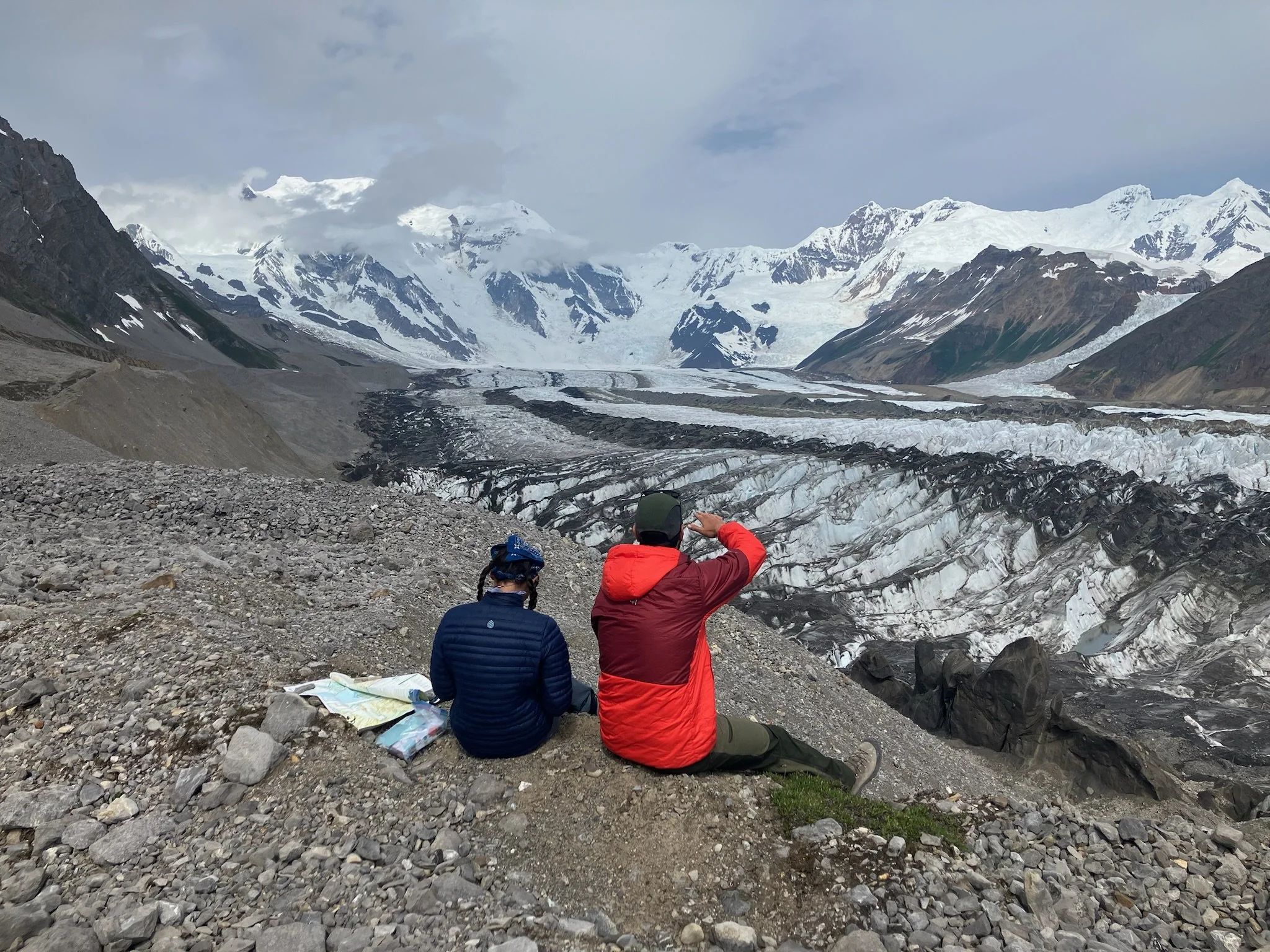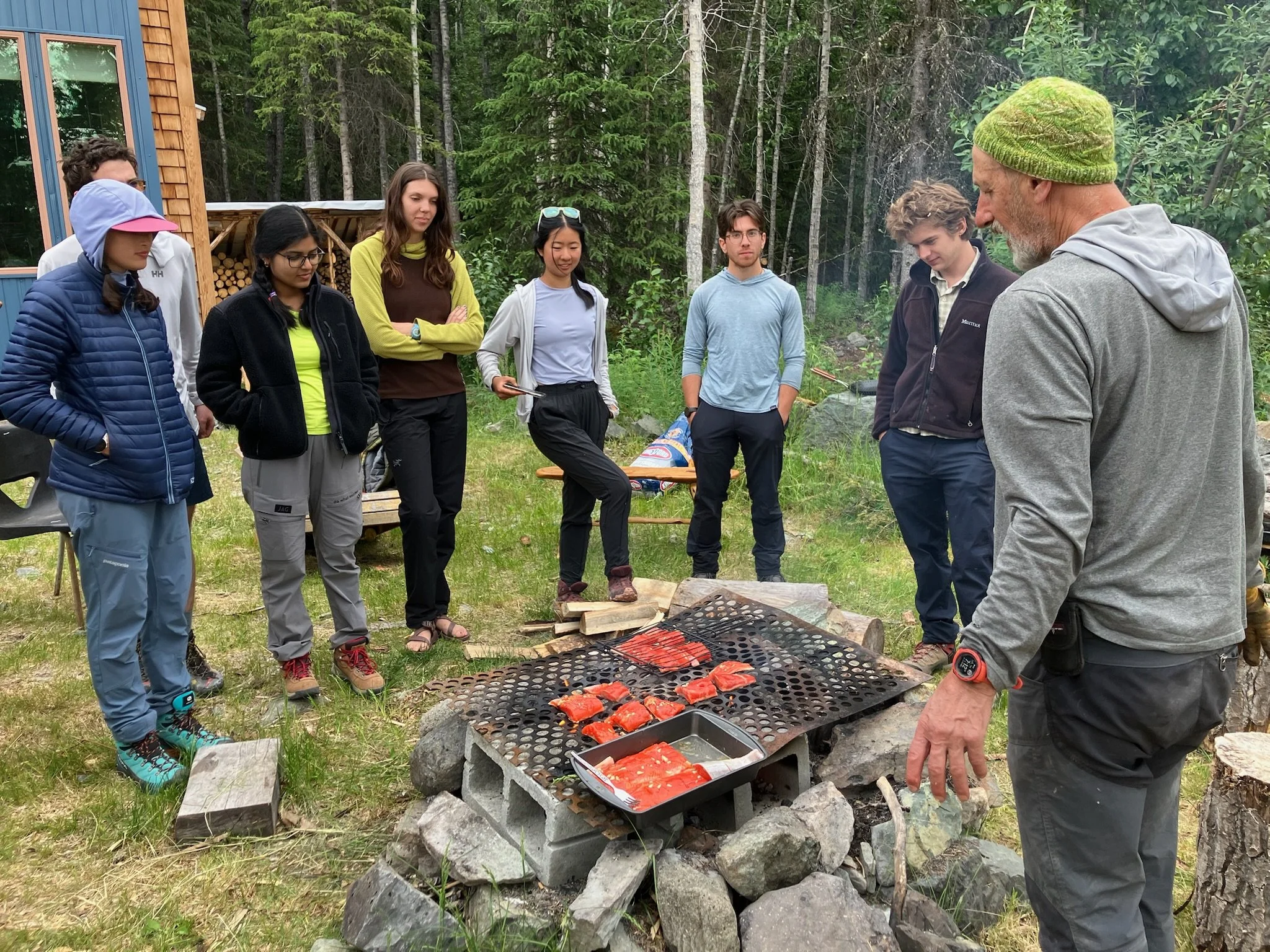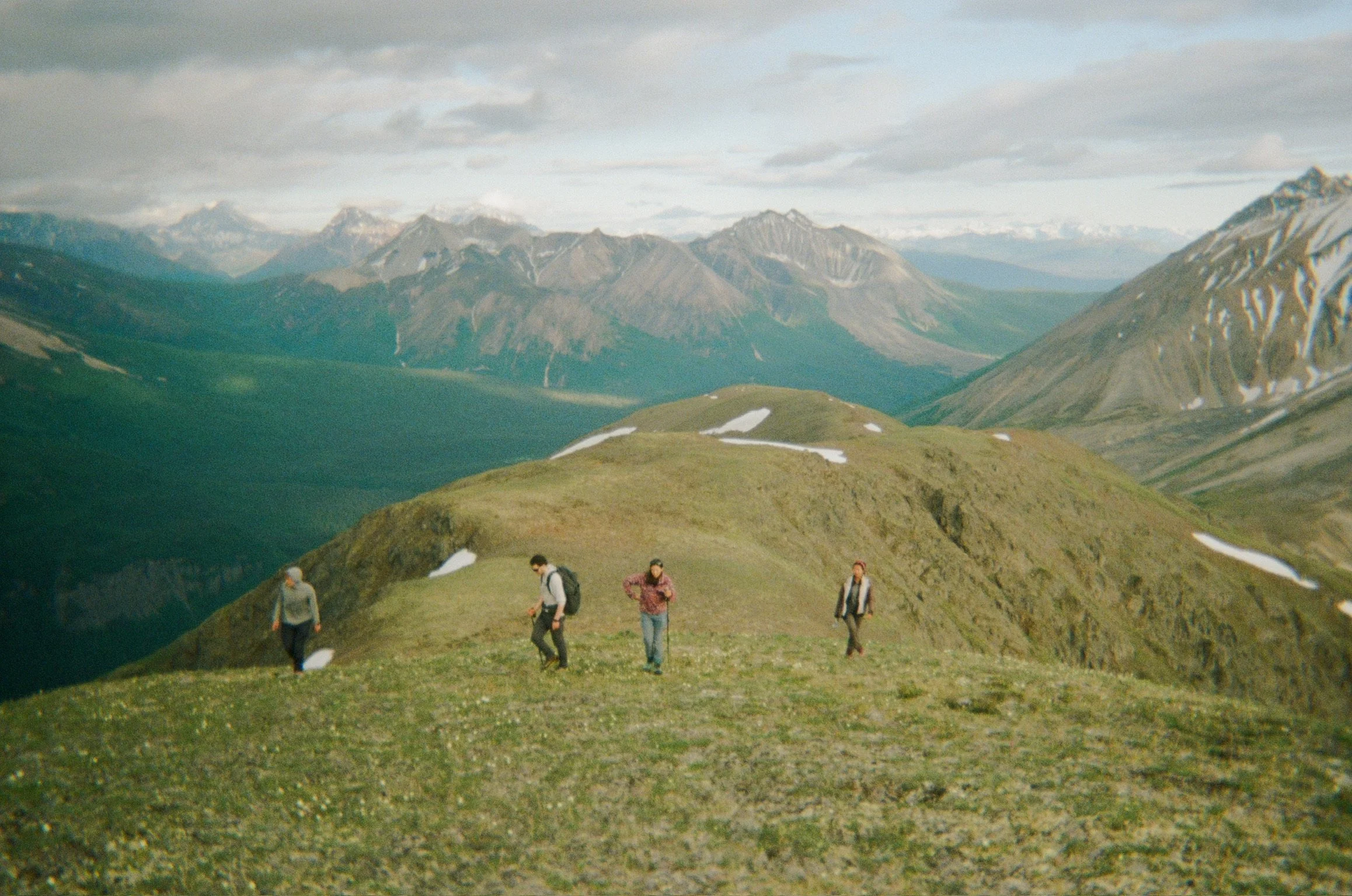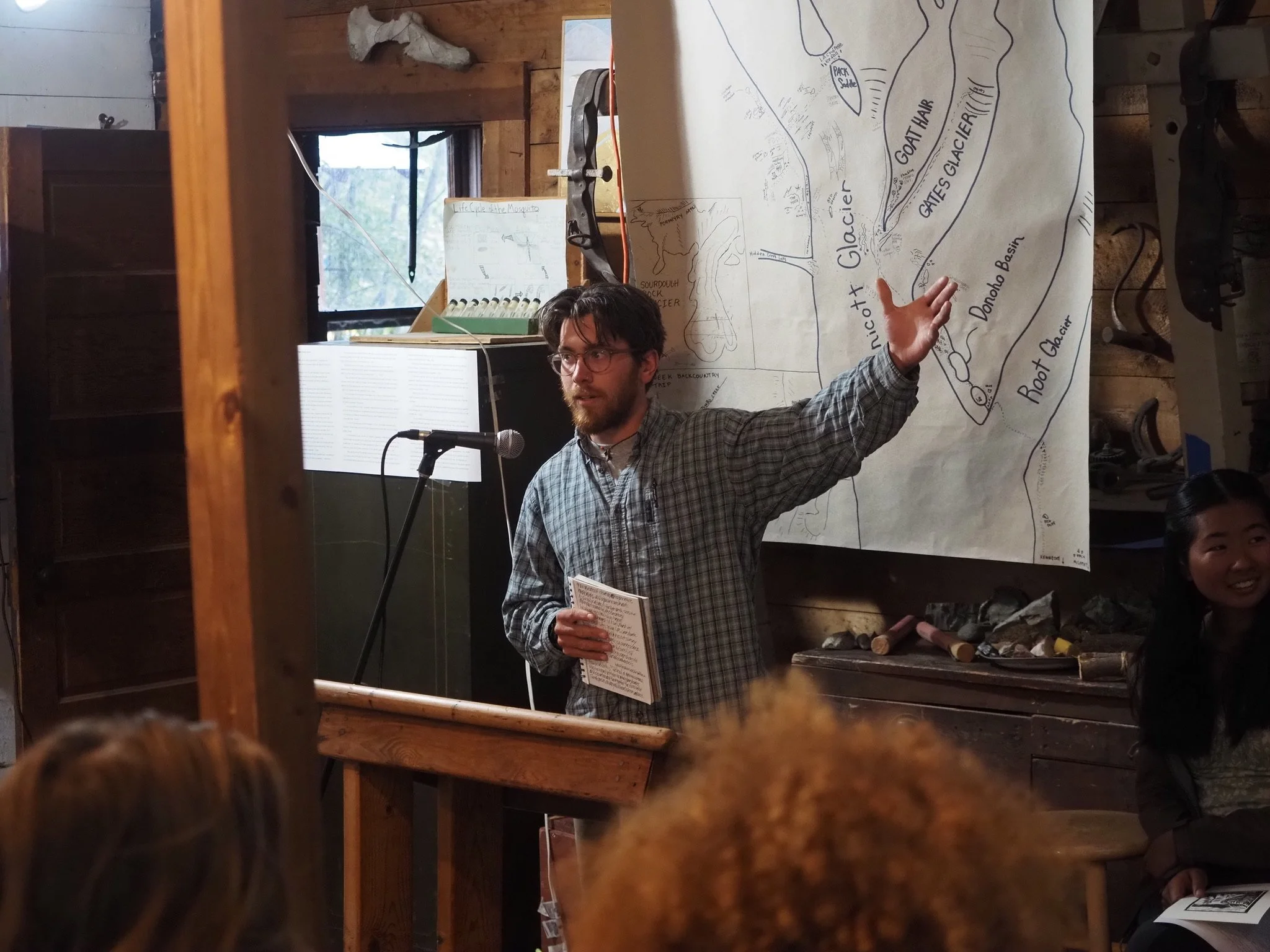
Info for Students
Learn more about the Field Studies Curriculum
Jump to:
Learn more about the total cost of Field Studies
Jump to:
Field Studies is a seven-week intensive field course for students interested in high-latitude landscapes. We study Earth system processes, ecology, glaciology, and climate change; and make connections with the arts, humanities, policy, and science communication. We are based in McCarthy, Alaska, a community within Wrangell-St. Elias National Park & Preserve.
Curriculum
Our curriculum explores climate-related changes to landscape processes, including glacier retreat, animal migration shifts, Arctic “greening,” permafrost thaw and consequent hydrological changes, and shifts in seasonal cycles. We see these as complex systems difficult to model or predict, linked by the flow of material and energy across wide temporal and spatial scales. Focus includes local ecology, geophysical processes, glaciology, complex system modeling, and land management in changing historical contexts. Local narratives and stories are important, as are seminars on readings.
Learn more about the Field Studies curriculum here.
Academic Credit
Students receive six (6) upper-division semester units for “Field Research Experience in Earth and Climate Sciences (ERS 499) from the University of Maine School of Earth/Climate Sciences. Our faculty is available to support the transfer of these credits to students’ home colleges or universities.
The curriculum is geared toward undergraduates, but graduate students and students unaffiliated with a university are also welcome. We work with graduate students and researchers to accommodate their research goals in the program. Field Studies generally meets departmental field research and/or capstone project requirements in addition to general credit requirements – we can provide information to students and/or their home institutions for any questions related to credit transfer.
Planning for Field Studies
Eligibility
Field Studies is an upper-division undergraduate course, though we are regularly joined by graduate students and students not currently affiliated with a university.
While there are no specific prerequisites to join Field Studies, students joining the program must be 18 or older and demonstrate motivation to engage in the course’s interdisciplinary academic content and backcountry expeditions.
Field Studies generally meets departmental field research and/or capstone project requirements for Earth/Climate Sciences, Geology, and Environmental Science/Ecology degree programs, in addition to general credit requirements. We can provide supplemental credit transfer information to students and/or their home institutions if needed.
Download our syllabus here.
Gear & Preparation
While helpful, no prior backpacking experience is required. Our Wilderness First Responder–certified faculty teach fundamental backpacking and field safety skills, guiding students of all experience levels to confidence in remote fieldwork conditions – and in off-grid living.
Field Studies is a physically demanding program. We travel solely by foot in the backcountry for 4 weeks total, walking up to 10 miles per day across varied terrain, at altitudes reaching up to ~2,000 m/6500 ft, with packs weighing up to approximately one-third of individual body weight.
We can provide advice and guidance on pre-program fitness, training, and preparation. Students should arrive ready to meet these conditions and to engage with off-grid, sustainable living practices.
Students will need to bring clothing and equipment suited to local conditions and fieldwork.
Download our Program Manual here.
Costs & Scholarships
Total tuition & fees for Field Studies 2026 will be between $12,500 and $13,500.
Most students pay for Field Studies through a mix of external grants and scholarships, as well as personal funding. Internal field fee scholarships are available through Wrangell Mountains Center.
Learn more about the costs associated with Field Studies here.
Program Timeline
Week 1 - Orientation (McCarthy)
Students arrive by shuttle from Anchorage and are introduced to each other and to instructors/staff, and are oriented to McCarthy and the Wrangell Mountains Center, the broader Copper River Basin region, the course reader, syllabus, and the Field Journal.
Introduction to McCarthy; meet locals, and get acquainted with the WMC campus
Learn fundamental backpacking and wilderness safety skills
Learn and practice natural history observation and field sketching techniques
Week 2 - First Expedition
On and near Bonanza Mountain, National Creek Pass, and rock glaciers above Kennicott, with natural history and alpine ecology seminars and observations, and presentations and discussions of local history and policy issues.
Exploration of alpine meadows, rock glaciers, and bare-ice glaciers
Introduction to field ecology, glaciology, and geomorphology techniques
Participate in faculty-led exercises and reading discussions
Weeks 4, 5, 6 - Three-Week Expedition
Route is determined by student research interests/final project needs and comprises a wide array of terrains and elevations. Majority of Field Journal entries will be produced in this phase. This trip includes a mix of daily backpacking and base-camping, determined by field sites selected. Two resupplies of food occur via plane at the end of the first and second weeks.
Traverse across the Kennicott Glacier and into the Wrangell Mountains
Perform group and individual field work; read the landscape and practice natural history observation
Lots of walking; three continuous weeks in the backcountry!
Week 3 - Project Preparation (McCarthy)
Seminars on readings, site-visits, workshops, and planning/preparation for small-group final projects.
Field research planning and methods design
Plan individual and small-group research projects
Prepare field equipment and practice field methodology
Week 7 - Project Synthesis (McCarthy)
Seminars on readings, site-visits, and workshops occur during this phase as well, but most time is spent compiling final projects and preparing for the Symposium, which occurs within the last three days of the program. Students depart McCarthy for Anchorage by shuttle on August 10th.
Analyze field data and construct final projects
Workshops in science communication and research presentation
Present as a group at the Field Studies Symposium at the Wrangell Mountains Center with a community audience
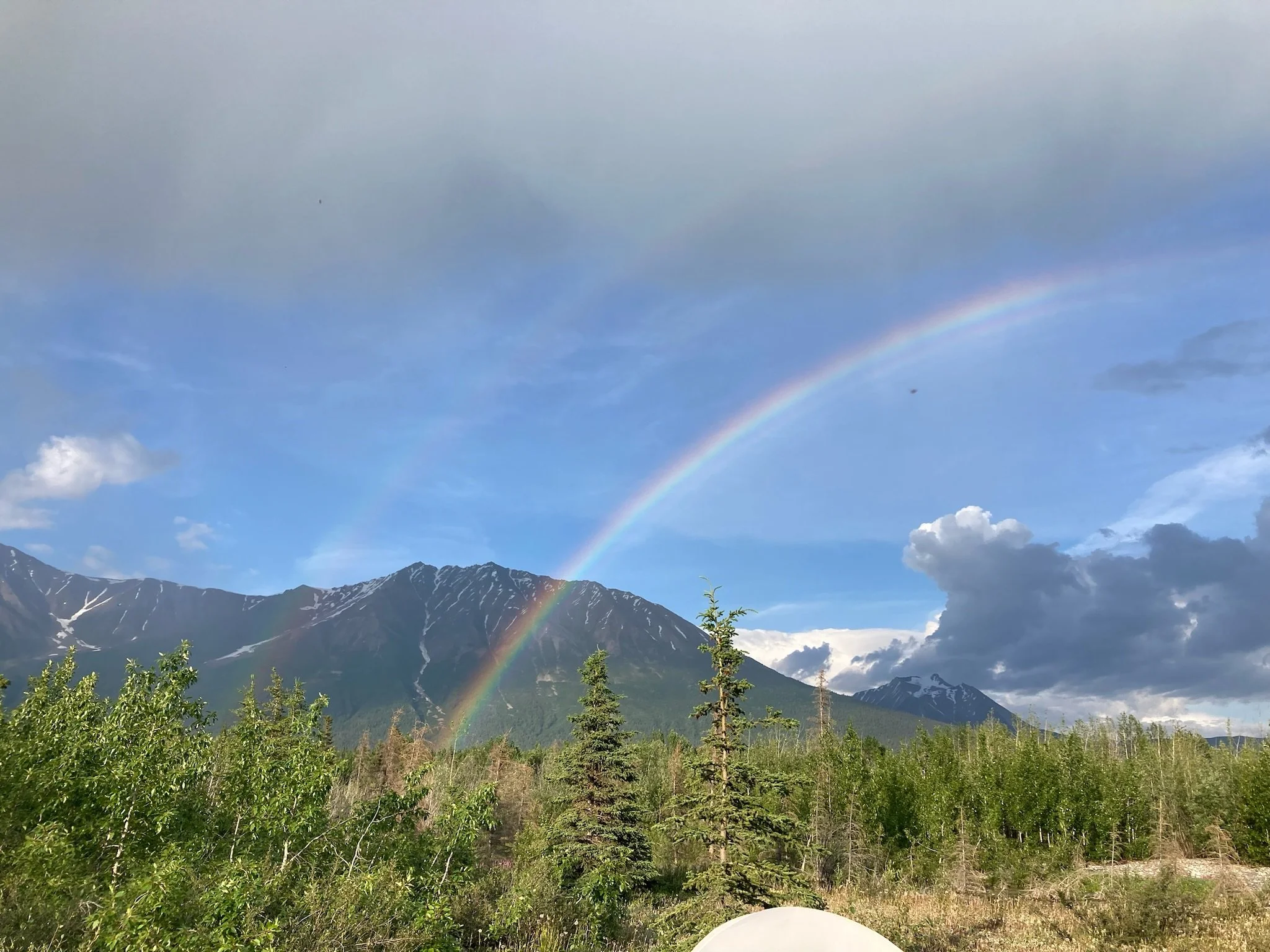
“I learned so much and had so much fun in the Field Studies program, exploring the backcountry, learning about and interacting with the town of McCarthy, getting to know my fellow field studies students, and working on our group projects. The program’s emphasis on place-based learning was invaluable to me, always encouraging us to think and ask questions about how aspects of the landscape interact with each other. I am incredibly grateful to have gotten the opportunity to learn about ecology, geology, and more in such a unique and hands-on environment, and I had a wonderful time in the program.”
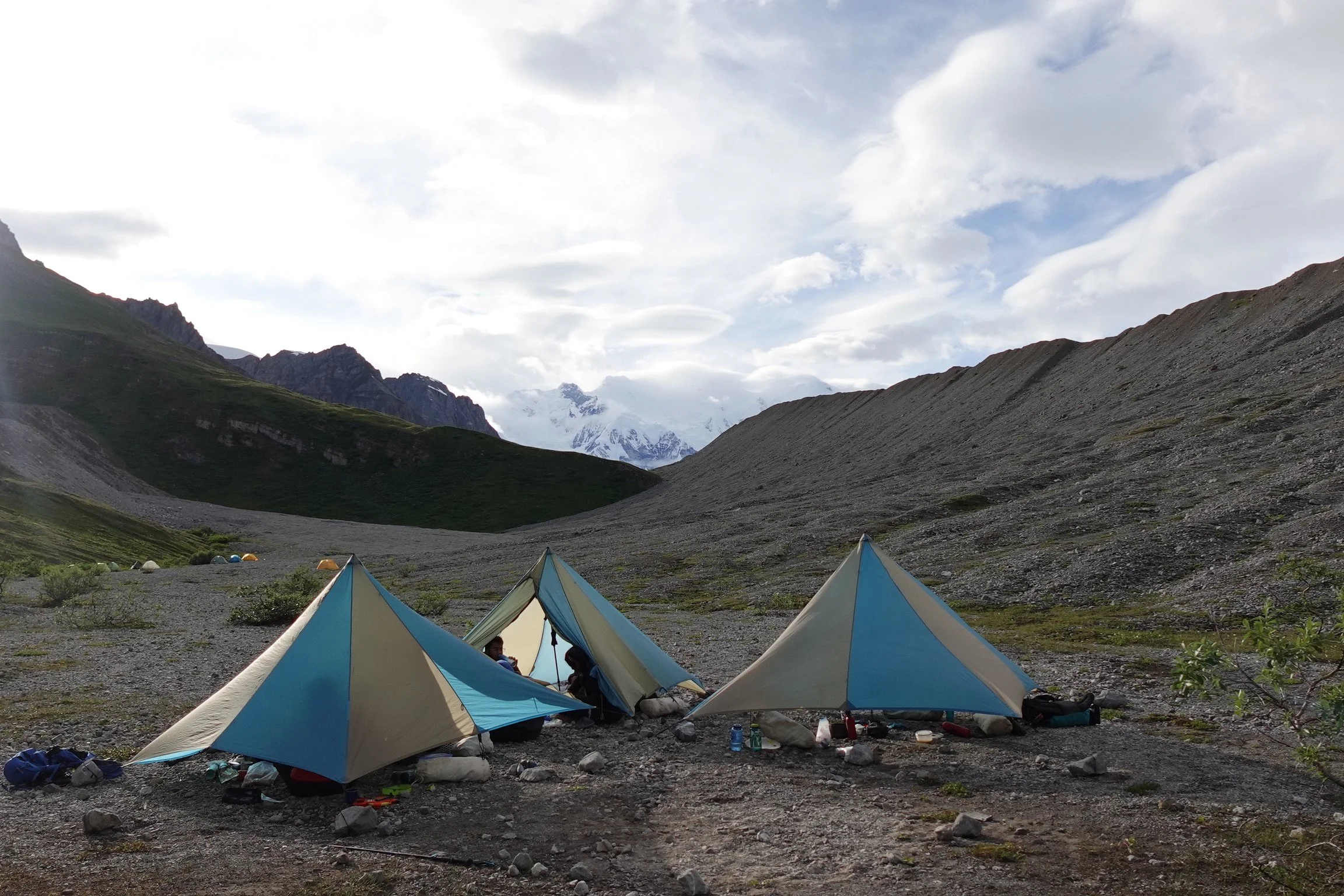
Ready to Explore the Wrangells?
Contact Us
Please submit this form with inquiries about Field Studies, or email fieldstudies@wrangells.org
